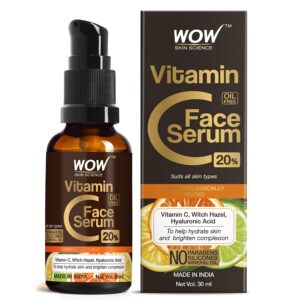How would you like to boost your immune system, reduce your risk of certain cancers, and sharpen your memory? There’s just one catch: you need to eat more vitamin C-rich foods. While most people consume plenty of vitamin C every day, there are some good reasons why your body may still be deficient in this essential nutrient. Read on to learn more about vitamin C deficiency and the best ways to boost your levels naturally through diet and B complex with vitamin c syrup.
Vitamin C Deficiency
Vitamin C is an essential vitamin, meaning that your body can’t make it, so you must get it from your diet. It plays a role in supporting immunity and heart health, wound healing, and bone growth. If you don’t get enough vitamin C from food or supplements, your bones can become thin and brittle, resulting in osteoporosis.
If you suffer from scurvy (caused by a severe vitamin C deficiency), it will slow down the healing time for wounds and make your gums start to bleed. You may also experience tooth loss over time. Vitamin C deficiency is rare for healthy adults since most foods are fortified with vitamin C; however, research shows that many Americans aren’t getting enough of it from their diets.
What is vitamin C good for?
The most well-known health benefit of vitamin C is that it can help prevent or alleviate colds and other upper respiratory infections. It’s important to note, however, that there isn’t enough scientific evidence to support its use as a prophylactic.
Hence you can use it routinely to avoid cold from social contacts. Despite not being able to prove its efficacy in preventing sickness, when someone does come down with a cold or illness, extra vitamin C can make symptoms like pain and inflammation significantly more tolerable.

B complex with vitamin c syrup & Vitamin C Benefits
B complex is an essential part of the immune system and when it comes along with vitamin c, it boosts your immunity in natural ways. Hence it is always advisable to take B complex with vitamin c syrup on daily basis in your daily routine to keep your body fit.
From Common Cold to Cancer Prevention, Vitamin C plays a very important role in Your Health. Vitamin C is a powerful antioxidant, and though it’s a water-soluble vitamin, you can actually consume too much of it. When taking high doses of vitamin C on a regular basis, some people may experience adverse effects like diarrhoea and abdominal cramping. To avoid these uncomfortable side effects, stick to eating foods that contain vitamin C instead of taking supplements. That way you’ll also benefit from all their other nutrients too!
What Are The Foods Rich In Vitamin C?
While vitamin supplements and fortified foods can help you reach a daily recommended intake of vitamin C, it’s important to also include foods rich in vitamin C in your diet. Depending on your age, gender and medical history, it’s recommended that adults consume 90 milligrams (mg) to 120 mg of vitamin C each day.
Many people don’t realize just how much vitamin C is actually packed into certain fruits and vegetables. For example, one cup of sweet red peppers contains about 93 mg of vitamin C, that’s more than half of what a grown man should be getting each day!
Role Of Vitamin C In Health
Vitamin C is an essential nutrient that helps maintain a strong immune system and helps in the production of collagen. It also plays an important role in the growth and repair of tissues, and helps to form some components of your bones, cartilage, teeth and blood vessels. Your body doesn’t make vitamin C on its own so you need to get it from food or dietary supplements.
There are many ways that vitamin C benefits your health. The most common symptoms of vitamin c deficiency include fatigue, dry mouth, sore tongue and a lack of appetite. Severe lack can cause muscle aches and mental problems like depression and confusion.
What is the best form of vitamin C?
Vitamin C is a water-soluble vitamin and comes in several forms. Vitamin C comes from food sources is natural because they are not made by humans. Synthetic vitamin C, on the other hand, is synthesized in a lab by scientists. While there have been conflicting reports on whether natural or synthetic vitamin C works better, we can agree that there is no need to worry about getting enough vitamin C as long as you eat a balanced diet (including fruits and vegetables). Some of these foods include acerola berries, bell peppers, broccoli, Brussels sprouts, guava fruit, kiwi fruit and strawberries. You can also increase your intake of vitamin C by taking a supplement.
How much vitamin C do I need daily?
The daily recommended dietary allowance (RDA) for vitamin C for adult men and women is 75 mg. Many people get a lot more than that, especially if they like citrus fruits or tomatoes. But too much of a good thing can be harmful, as with vitamin A, so talk to your doctor before you take more than 300 mg of vitamin-C supplements each day.
vitamin c side effects
As with any supplement, too much vitamin C can result in nausea, bloating and diarrhoea. However, it is unlikely that you would take such a high dose of vitamin C each day to cause these symptoms. Vitamin B complex supplements and some pharmaceutical drugs also can interact with vitamin C in your body and cause side effects. Your kidneys are responsible for getting rid of excess vitamin C through urine; if they are not functioning properly or if you have an underlying condition that interferes with kidney function, side effects may be exacerbated. High doses of supplemental vitamin C also may raise blood levels of uric acid, which could lead to gout or kidney stones in some people who are predisposed to these conditions.
The Ordinary Vitamin c serum uses
It also acts as an anti-ageing and anti-wrinkle drug. Vitamin C is a powerful antioxidant that’s essential for maintaining healthy collagen levels. Collagen forms connective tissue in the skin, which is what keeps your skin from sagging or wrinkling. As you age, it loses its elasticity and volume, so applying vitamin c serum to your face helps reverse signs of ageing like fine lines and wrinkles. The right formula should also moisturize skin. If you have oily skin, check out oil-free formulas that still pack a punch when it comes to antioxidants. No matter how your skin type, you can use vitamin c serum as part of your daily skincare routine in place of a moisturizer if you want something lightweight but effective!

Role of vitamin c serum for facial glow
Foods that contain vitamin c but eating them cannot make up for a deficiency in your diet or to get enough vitamin c in your system. Your skin does naturally produce collagen, so it’s important to keep it healthy and moisturized. If you want to use food as a way to keep your skin looking great, eat plenty of foods with vitamin c. Vitamin c comes from citrus fruits like oranges and lemons. Vegetables like broccoli and tomatoes also have high levels of vitamins, so they’re good sources of natural collagen-boosting nutrients if you don’t like fruit juices or smoothies.




